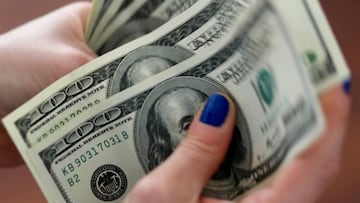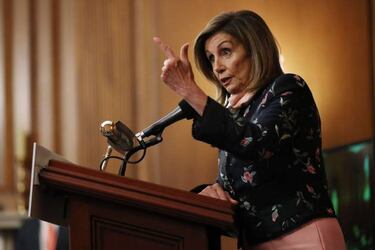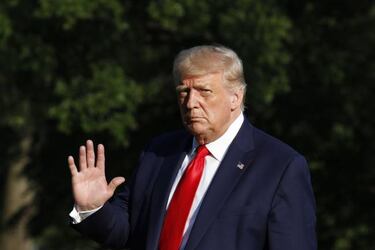Second stimulus check: is $40,000 salary limit going to pass?
Many Americans are hoping that a second payment will be issued to them soon, but the salary limit proposal may mean some that need support miss out.

Discussions over a second stimulus package are expected to come to some sort of conclusion over the coming weeks, and with a $40,000 salary limit getting much attention, we wanted to get a feel for who was saying what about it and if it was likely to get agreement.
Is a $40,000 limit going to be added to second stimulus check?
“Next week, we'll be beginning a new bill,” Senate Majority Leader Mitch McConnell said on Monday during an interview with WRVK radio in his home state of Kentucky. He added that the legislation, which has not yet been unveiled, will likely be more contentious than the previous four coronavirus aid bills that fuelled more than $3 trillion into the hobbled economy with a combination of business loans, expanded unemployment benefits for workers and direct payments to families.
“I do think we'll get there and do something that needs to be done,” McConnell added, predicting that a final outcome will be announced before Congress begins its August recess.
- Second stimulus check and other proposals on the table
- $600 benefits boost: next stimulus bill needs to hurry
- Second stimulus check $40,000 limit: calculate how much you can get
- Paycheck Protection Program (PPP): will I be taxed on my loan?
- Revealed: what companies got PPP loans?
There are, however, divisions among Republicans - in the White House and in Congress - over the precise direction of the bill, including whether there should be another round of direct payments to individuals and families. And on that, the Kentucky Senator has already had much attention on the change to the salary limit that defines who would be eligible.
"I think the people who have been hit the hardest are people who make about $40,000 a year or less,” McConnell said. “Many of them work in the hospitality industry. The hospitality industry, as all of you know, just got rim-racked - hotels, restaurants - and so [more stimulus checks] could be part of it. The country needs one last boost."
In May, Federal Reserve Chairman Jerome Powell pointed to the fact that 40% percent of Americans who were earning less than $40,000 a year lost their jobs in March. There appears to be little doubt that these are the people that have faced the greatest economic burden of the coronavirus crisis and are least able to bear it.
So, what is being said about the proposed limit ahead of the more formal debate?
Views on the $40,000 salary limit
House Speaker Nancy Pelosi suggests it’s too low a bar, with some of those earning more also requiring help.
“I think there are many families, depending on the size of the family, so many different things, that $40,000 would have to be explained, justified, the rest,” she said. “But I think families making over $40,000 probably need assistance. Again, just depending on their family situation.”

Jeff Stein, White House economics reporter for The Washington Post took to Twitter to suggest that the limit was a planned approach gaining traction.
“Multiple sources say McConnell didn’t just throw out $40,000 as a cut-off haphazardly. Consensus within GOP is moving that direction, which would sharply limit eligibility,” he tweeted.
Chief financial analyst for Bankrate, Greg McBride, has put forward his view.
“Replacing this lost income will help keep consumers current on bills and maintain a level of spending that is beneficial to the economic recovery,” he stated via Forbes. “The widespread hit to household income from the pandemic, the length of time for that income to recover, and a pervasive fear of it happening again will all weigh on the economic recovery.”
“Lower income and worries about lower income have a direct effect on consumer spending. Getting money into those consumers’ hands is needed sooner rather than later.”
And Amanda Novello, a senior economic policy associate with public policy research group The Century Foundation, also makes a clear case for those above the proposed $40,000, calling it ‘absurd’.
“We are facing so many intersecting urgent crises and not enough is being done to stop the bleeding. Some 25 million people are about to lose a critical lifeline provided by additional unemployment insurance at the end of July, and 30 percent of Americans missed housing payments in June.

“We shouldn’t be means testing - especially at such a limited level - in the face of such insurmountable need. Think about someone who made $50,000 last year, but has near-zero savings, and lost their job this year, and they're about to lose any meaningful unemployment benefit.
“This policy says they don't qualify for assistance. That's just absurd. We still need the same things we needed three months ago: an additional federal unemployment benefit, a moratorium on evictions and generous direct cash assistance.”
Other factors will play their part in negotiations
At a time when more, not less, clarity is required, Republicans have been putting forward a variety of options that include reforming enhanced benefits or potentially replacing them with a back-to-work bonus, although are not happy with the $600 program being continued.
Related stories
“We’d like to see some unemployment reforms,” said Larry Kudlow, director of the National Economic Council, to Fox News earlier this week. “We’d like a return-to-work-type bonus of a modest nature. We don’t want to give people disincentives.”
There is clearly still a lot to be discussed, and unfortunately those in most need of the support will have to struggle on until decisions are made. The hope is that when it is, those people are the ones to received it.

